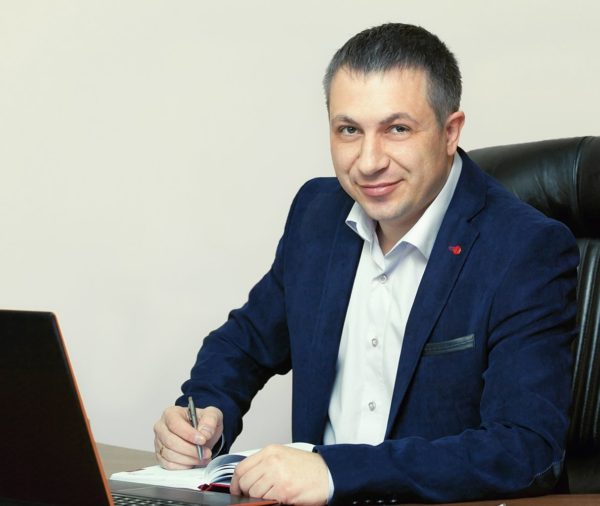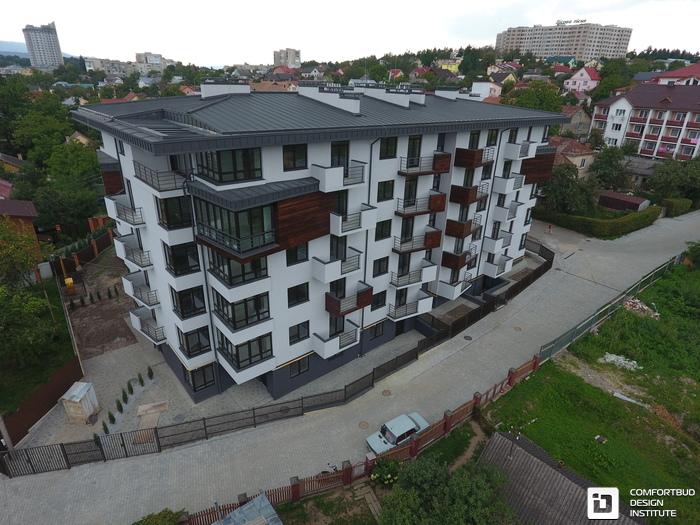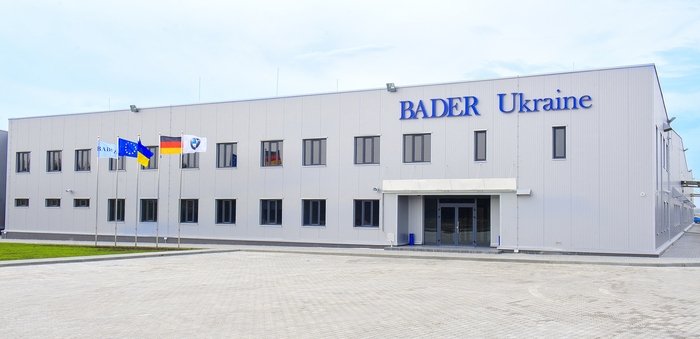
Andrii Vyshnevskyi, director of the Comfortbud Design Institute at the URE Club conference «Architecture and Design: What’s Extra Value», in an interview with Property Times, told about the situation in city-planning in Ukraine, the prospects for industrial construction and the internship program for students.
— Your project of apartment house in Truskavets won in the «Award of the National Union of Architects of Ukraine 2017», becoming the best in the category «Apartment houses / Realizatio». What helped you to win?
— The idea of the project was to create business apartment for people who want to buy apartments in Truskavets and enjoy it during the holidays. The customer treated the project very responsibly. Together we aimed to build a comfortable apartment, designed for middle and higher of middle class. And we successfully coped with the task.
— What is the «highlight» of the project??
— It attracts original solutions in planning the accomplishment of the adjoining territory, the design of the facades, comfortable areas for rest, as well as qualitative planning of apartments. When designing the facility, we initially understood, I this apartment will be not for permanent use. It was emphasized on this. In this project, we took as a basis a rather standard and optimal planning solution, adding several «chips»: the chaotic arrangement of terraced balconies, sloping roofs with a small slope and a large drain of cornice covering these balconies-terraces, removing the volume of premises for facade, windows and corners – and the project played completely different colors.

Apartment house, Truskavets
— «Comfortbud» DI designs various objects from agro-industrial to residential buildings and schools. Could you highlight which of the directions you work more comfortable and interesting?
— Today, housing is in a trend, of course. But we understand that this will not be continuous, because trends are constantly changing. Therefore, we do not focus on specific types of buildings and design various buildings. It is very good that today in our portfolio there are objects of different purposes and complexity. This is housing, and objects of public purpose, industrial, logistic, agrarian. We also work with infrastructure objects. For example, in our portfolio of projects there is a school designed according to the modern European model. It was built in one of the residential complexes along with Kiev. It is a private school; it provides the needs of the inhabitants of the complex. It is noteworthy that the customer of the facility was the developer of this complex.
— Do you work on social objects??
— A few years ago we took part in the contest for the reconstruction of the Trinity Square in front of the «Olympic» stadium and took one of the prize places. We also took part in the initiative on the improvement of the surrounding territories; we pay much attention to this. It is important for us to make people’s lives as comfortable as possible.
— You have a lot of industrial objects, let’s talk about it. How would you overall assess the state of this segment in Ukraine? What are the problems for today and how to solve them? For example, what do you think it is necessary to do with the Soviet legacy, whether it has the right to life or not?
—Those objects that have remained since Soviet times are mostly in a much neglected state. Most of them occupy a huge, useless, in terms of functional, territory. If, for example, the plant needs 20 thousand square meters of functional territory, today the same or even more powerful production can be organized on the square, four times smaller. Technology has evolved, equipment has become more unified, it is less and more efficient. Often, it is more advisable to build a new plant than to reconstruct the existing, and then break the head, how to use the remaining area. That is why investors, especially European, often do not consider the options for reconstruction of existing industries. They take the platform and build the company from scratch. It is much more effective.

Factory of sewing automobiles covers «Bader-Ukraine», Lviv region
— So there is no future for the old objects?
— They may be interesting when it comes to more extensive industries, such as cement manufacturing, or materials requiring deployed infrastructure. For example, the use of these objects for a different purpose. Just now in Kiev there are some successful projects that allow us to look at the former industrial objects at a new angle, and we are also interested in experimenting in this direction.
— What requirements does the customer put forward to modern industrial objects?
— There are certain standards that require the necessary level of sanitary conditions for workers of such enterprises. Current production is much cleaner than before. Investor invests a lot of money in engineering networks. A very important aspect was energy conservation. Now, each investor calculates energy costs, thinks that it is best to invest more in the energy efficiency of the building and in the future spend less on energy resources, or save now and condone itself for additional operating costs. As a rule, foreign investors do not consider short-term projects, so the issue of energy efficiency and the use of high-quality materials devote a lot of attention. They understand that the payback period of the project may be more than ten years.
— Is there more foreign investment?
— Most often, yes. Our investors are less. Most of the developing ones are agribusiness. These companies, which have been present on the market for a long time, are working here and developing, investing in modernization. They build a little; they often get what they already have.
— What projects you have not had yet, but would like to work with them?
— Our ambitions are the work of designing large objects, perhaps even grand ones. Today, even in Lviv there are competitions for the design of large interesting objects, including multifunctional complex, city archive.
— Do you have projects outside of Ukraine?
— Yes, we managed to work on the project of a residential complex in Kazakhstan in 2015, now we have a great resort in Zanzibar, Tanzania. We are also actively involved in international architectural competitions. More recently, we participated in a competition for the design of a large public center in one of the cities of Poland. According to the design of the customer, it must become a peculiar center of cultural life. Today, our work has repeatedly fallen into the top five.
— Did you distinguish yourself from the approaches to the evaluation of such competitions in Ukraine and abroad?
— I will not comment on the evaluation, but I can say that in foreign competitions the competition tasks are always very detailed, very qualitative preparation of such competitions. The jury consists of well-known architects. The difference is significant; there is a much higher level of organization. Competition is an opportunity for an investor to get an interesting project, and for an architect — to show his level.
— How do you assess the situation in Ukraine in the field of city-planning development? Where will we move next, which trends will prevail?
— In Ukraine everything is being spontaneously built up, especially in large cities such as Kyiv and Lviv. It would be desirable that all this be more streamlined. Today, housing is being built, and, unfortunately, there is little to think about infrastructure, because it is not so interesting economically. I think that public authorities should motivate investors to take care of infrastructure.
— How to motivate?
— There must be some motivational programs. If an investor builds a residential quarter, he puts money on infrastructure development, and this money should be used exclusively for their intended purpose. I believe that now it’s not quite a good situation when a residential quarter is being built, and then the question is raised about the lack of places in kindergartens, schools, etc.
Today there are investors who have been present for quite a long time in the domestic market and are well acquainted with European practices. They pay attention to this issue, care about the fact that in the residential quarter there was a kindergarten, even if part-time of stay, shops, cafes and other enterprises of service of the population, zones of comfortable rest of the inhabitants.
— Does this relate mainly to housing of comfort class and higher?
— Preferably, yes. In addition, we have another major problem. Today, almost everyone who wants to buy social housing has already done it. Most people, buying housing today, are simply investing in real estate, and it is unknown who and when will live in these apartments. A lot of such apartments today are empty, there nobody lives and in the next few years, apparently, not even going.
— What cities should we equate with in the world practice of city-planning development?
— It’s Scandinavian countries, Germany, Holland, even Poland.
— Why Scandinavia? There’s a totally different mentality.
— There people put money rationally. They understand that building impersonal housing is wrong, it will not have value. The developer takes care that everything is harmoniously combined so that there is a balance between housing and infrastructure. There, like us, is expensive land, but there is no race in height. In Europe, Trend housing three or four floors, most people prefer private housing.
— And Poland?
— I am watching what they are referring to infrastructure – green areas, cycle tracks, sidewalks, everything is done very neatly.
— We are moving a little further in this direction?
— I think so, because developers today have to fight for the client. People are interested not only in square meters, but also in what houses they will live in, how they look, what they will surround, where their children will go, what they will do. In an oversaturated proposal, the developer should look for ways to make housing more attractive.

Apartment house of comfort class «Z119», Lviv
— Tell me why you decided to start an internship program for Lviv Polytechnic students? What does this give your company?
— We believe that students have enormous potential. They have not yet reached the goal of life, but they have ambitions. Students need to be sent, pushed in the right direction. In addition, students travel a lot, have a lot of information, they see with their own eyes modern trends in architecture. These are people who think altogether differently, they are more pro-European, can generate interesting architecture.
— What is the essence of your program?
— Together with the Lviv Polytechnic we organize internships for senior students. So far this applies only to architects, but in the long term we plan to attract other specialties. Students get the opportunity to work in our company on real projects, from the architectural idea.
If we have a new site, we are conducting an internal competition, respectively, each student who has an internship with us, can offer his original idea.
— And who can get to your internship, how is the selection?
— We look at the extent to which one or another student is interested for us, studying his work. We interview, look at the portfolio that he had time to work through during his studies. Of course, we understand that this is not a real project, but educational, but we can see the student’s approach to designing, his ability to generate interesting ideas. If a person is creative, we accept him for an internship.
— How do you rate the level of education in Ukraine that the architects get? Is it enough?
— He is sufficient to start moving somewhere. I see that today many students pay a lot of attention to self-education. They understand that they do not have the same level of education as a basic university. In fact, they begin to self-illuminate already from the second to third year.
— Has any of the trainees continued to work for you?
— We are currently working with two students who came to us. They actually went through the internship and stayed with us.
— Do you plan to further develop this program?
— Yes, while the program works only in Lviv, we hope that it will eventually organize something similar in our Kyiv office.
According to the Property Times. Author: Irina Nastich.

0 Comments